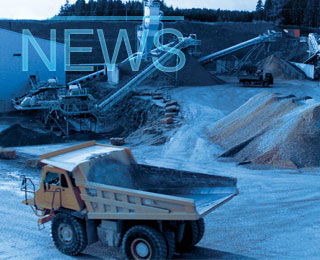Turnover at RMC Group declined by 2.0 per cent in 2003 to £4873m (€7056.2m), while the operating profit at the EBITDA level remained unchanged at £456.7m (€661.3m). The trading profit declined by 4.3 per cent to £235.8m (€341.4m) and following a 6.3 per cent reduction in the net interest charge to £78.4m (€113.5m), the running profit before tax emerged 4.7 per cent lower at £121.8m (€176.4m). After taking into account property profits of £11.2m (€16.2m) and net exceptional losses of £265.9m (€385.0m), mainly on the writing down of assets, the group reported a pre-tax loss of £132.9m (€192.4m). Both in terms of trading and exceptional results, Germany contributed heavy losses of €69.9m and €341.1m respectively.
In Great Britain, turnover rose by an underlying 2.3 per cent to £1116.5m (€1616.7m), while on the same basis, the EBITDA advanced by 7.1 per cent to £116.2m (€168.3m) in spite of a £5m (€7.2m) increase in the pension charge. Operational performance improved at the Rugby cement plant, with clinker production increasing by 21.8 per cent to 1.05Mt. Cement sales were static at around 3Mt, suggesting a slight improvement in the share of a market that is estimated to have been off by around one per cent. Geographical mix and concentrating on margins led to a 6 per cent drop in deliveries to some 6m cu.m, while the aggregates tonnage fell by three per cent, broadly in line with the market, to 33Mt.
Germany contributed a turnover of £758.3m (€1098.0m), a fall of 10.3 per cent, with exchange rates reducing the number by 9.4 per cent. The EBITDA dropped from £43.9m (€70.2m) to just £9.7m (€14.0m), which translates into a trading loss of £48.3m (€69.9m). By further increasing internal sourcing of cement and a slight increase in exports, the cement volume rose by 9 per cent to around 4Mt in a modestly reduced market. Readymix also gained market share in ready-mixed concrete, where deliveries were 4 per cent higher at 10.5m cu.m while national volumes were 2 per cent lower. The same story applies to aggregates, where a static output of 24m tonnes compares with a 4 per cent fall in the market. Cement prices were €15 per tonne lower while the decline in ready-mixed concrete amounted to €7 per cu.m, but pricing in aggregates and concrete products was broadly stable during 2003.
David Munro, the chief executive, insisted that, without its German problems, RMC last year would have seen a 22 per cent rise in earnings and had cut net debt, UK£1.5bn two years ago, to pounds UK£914m by the year’s end. With the recent UK£92m return of an intra-company loan, gearing was now less than 50 per cent, allowing RMC to invest for growth in regions such as the United States and eastern Europe with further acquisitions. Mr Munro said RMC had decided to hold on to its loss-making Readymix AG business in Germany after rejecting an unsolicited approach from troubled Heidelberger-Cement late last year. Pointing to a likely 2-3 per cent recovery in German demand this year, he said prices should rise from the depressed 2003 level of Euros 30 a tonne, boosting earnings by Euros 30m this year and enabling RMC’s German unit to make a profit in 2005.
